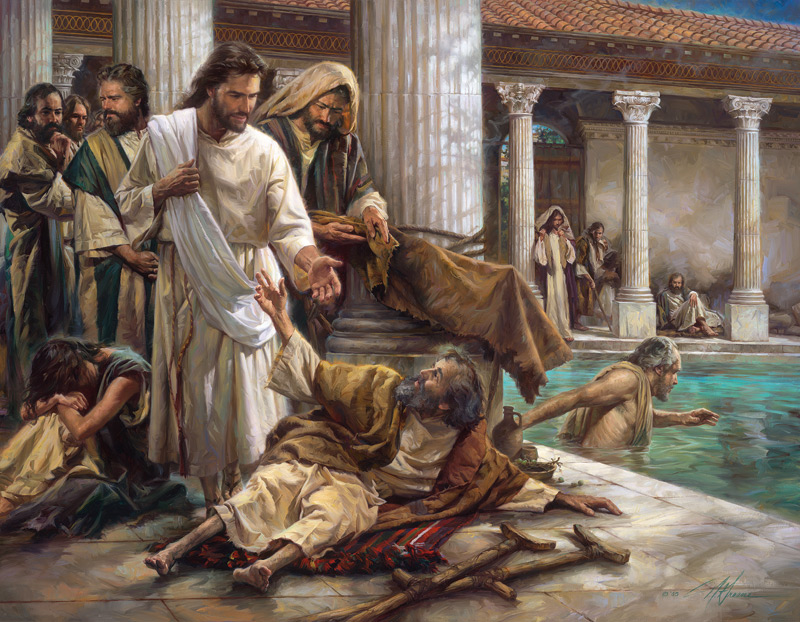There was a feast of the Jews, and Jesus went up to Jerusalem. Now there is in Jerusalem at the Sheep Gate a pool called in Hebrew Bethesda, with five porticoes. In these lay a large number of ill, blind, lame, and crippled. One man was there who had been ill for thirty-eight years. When Jesus saw him lying there and knew that he had been ill for a long time, he said to him, “Do you want to be well?” The sick man answered him, “Sir, I have no one to put me into the pool when the water is stirred up; while I am on my way, someone else gets down there before me.” Jesus said to him, “Rise, take up your mat, and walk.” Immediately the man became well, took up his mat, and walked.
Now that day was a sabbath. So the Jews said to the man who was cured, “It is the sabbath, and it is not lawful for you to carry your mat.” He answered them, “The man who made me well told me, ‘Take up your mat and walk.$0"1$ They asked him, “Who is the man who told you, ‘Take it up and walk'?” The man who was healed did not know who it was, for Jesus had slipped away, since there was a crowd there. After this Jesus found him in the temple area and said to him, “Look, you are well; do not sin any more, so that nothing worse may happen to you.” The man went and told the Jews that Jesus was the one who had made him well. Therefore, the Jews began to persecute Jesus because he did this on a sabbath.
John 5:1-16
This pool was one among many examples pointing to baptism, which was to purge away sin. First God created water for cleaning dirt from the body, and from those defilements according to the old covenant e.g. those from death, or leprosy. Afterwards infirmities were healed by water, as we read in today's Gospel. This was a nearer approximation to the gift of baptism, when not only defilements are cleansed, but sicknesses healed. The water, however did not heal by virtue of its own natural properties, (for if so the effect would have followed uniformly,) but by the descent of an Angel. In the same way, in Baptism, water does not act simply as water, but receives first the grace of the Holy Spirit, by means of which it cleanses us from all our sins. But then their infirmities prevented their applying the cure; for it follows, "Whosoever then first after the troubling of the water stepped in, was made whole of whatsoever disease he had." But now every one may attain this blessing, for it is not an Angel which troubles the water, but the Lord of Angels, which works every where. Though the whole world come, grace does not fail, but remains as full as ever; like the sun's rays which give light all day, and every day, and yet are not spent. The sun's light is not diminished by this bountiful expenditure: no more is the influence of the Holy Spirit by the largeness of its outpourings. Not more than one could be cured at the pool; God's design being to put before men's minds, and oblige them to dwell upon, the healing power of water; that from the effect of water on the body, they might believe more readily its power on the soul.
參考 Reference:
Catena Aurea (St. Thomas Aquinas)
Homily 36 on the Gospel of John (St. John Chrysostom)
